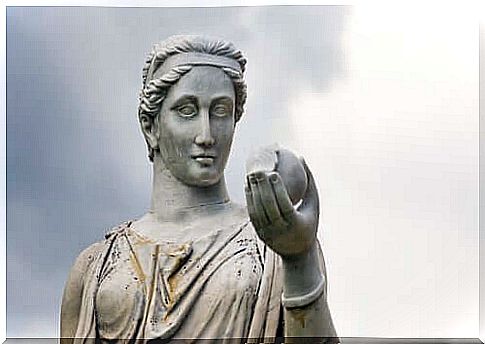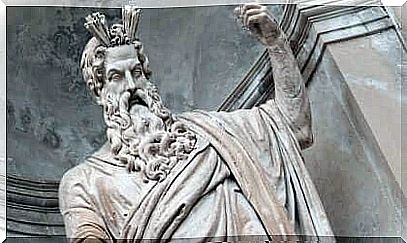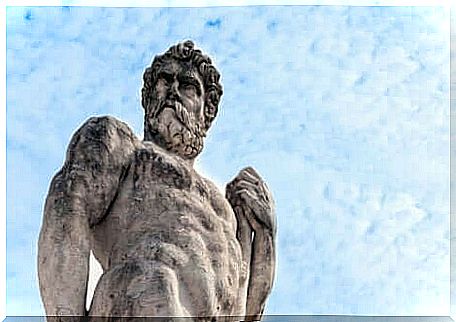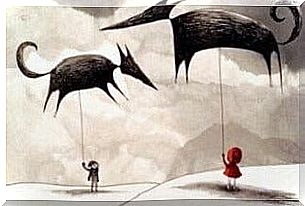The Myth Of Hera – Goddess Of Olympus

The myth of Hera gives life to one of the most classical and yet flawed facets of the female character as it is considered by Greek society. She was a wife-like figure plagued by feelings of jealousy, and she never missed an opportunity to take revenge on her enemies.
It was the constant infidelity of her husband, Zeus, that constantly forced her back into this role.
To the Greeks, the myth of Hera represented the archetype of the typical woman. She was the goddess of marriage and family life, and she defended these sacred institutions at all costs. She was the most important female divinity in Olympus. Somehow, she almost always managed to get what she wanted.
One of the most striking things about the myth of Hera is the fact that every time Zeus was unfaithful to her, she made sure to get her revenge. The target of her anger, however, was almost never her husband. Instead, she focused her anger on Zeus’ lovers and the children he had with them. This was despite the fact that Zeus often got his lovers by tricks or coercion.

The origin of the myth of Hera
Hera was the daughter of Cronus and Rhea. Although she later became his wife, it also meant that she was actually Zeus’ sister. Like all of Cronus’ children, Hera was devoured by his father shortly after his birth, after an oracle predicted that one of his descendants would overthrow him.
Zeus was spared this fate when his mother devised a plan to save him. He later managed to free his siblings, including Hera.
As the story goes, Zeus fell deeply in love with Hera. After she rejected his approaches, he turned into a cuckoo to get close to her before taking her by force. Their wedding was a lavish affair, which was held in the Hesperides Garden.
The two had several children together, including Ares, the god of war, Hebe, the goddess of youth, Ilithyia, the goddess of birth and midwifery, and Hephaestus, the blacksmith of the gods.
Although Hera is the goddess of marriage and family, she was not portrayed as a good mother. For example, she rejected her son, Hephaestus, because he was ugly, and she banished him from Olympus. He got his revenge by making a magical throne for her. When she sat down on it, she could not get up again. However, the spell was lifted when Hephaestus took Aphrodite as his wife.
Hate for Heracles
The famous Greek hero, Heracles (better known as Hercules), was the result of one of Zeus’ many affairs. As a result, Hera hated him, and she was constantly trying to find ways to destroy him.
His mother, Alkmene, named her son Heracles (meaning “honor of Hera”) in an attempt to avoid the wrath of the goddess. However, this did nothing to reassure the goddess of Olympus’ anger.
As the story goes, Zeus tricked Hera into breastfeeding baby Heracles so that his child could drink milk from the gods. When Hera discovered this deception, she threw the baby away, causing a jet of milk to squirt into the sky. In this way, the Milky Way was created.
Years later, Hera decided to punish Heracles with the famous “Heracles’ Twelve Works”. Although he completed them, she continued to pursue him for the rest of his life. Zeus and many other gods did their best to protect the hero through the tasks Hera had given him, which thwarted the queen’s plan.

A proud and arrogant goddess
The many myths surrounding Hera show that the goddess acted not only out of jealousy but also out of pride. It is said that she blinded the prophet Tiresias when he chose her husband’s side in an argument against her. She was also one of the primary initiators of the famous Trojan War.
On one occasion she tried to lead a coup against Olympus. She met Poseidon, Apollo and Athena in secret, and the four planned to overthrow Zeus, who fortunately knew nothing of their plans.
While he slept, they chained him to his bed and stole the thunderbolt that gave him his powers. Next, they began to discuss who should be the new leader of the gods in Olympus.
As the heated discussion continued, Brireus, a giant with a hundred hands, appeared unnoticed in the picture. He liberated Zeus, who regained control of Olympus, and punished the conspirators severely.
They begged for his forgiveness, and they swore eternal loyalty to him. Despite the many infidelities and great disloyalty between them, the marriage between Hera and Zeus never ended.









